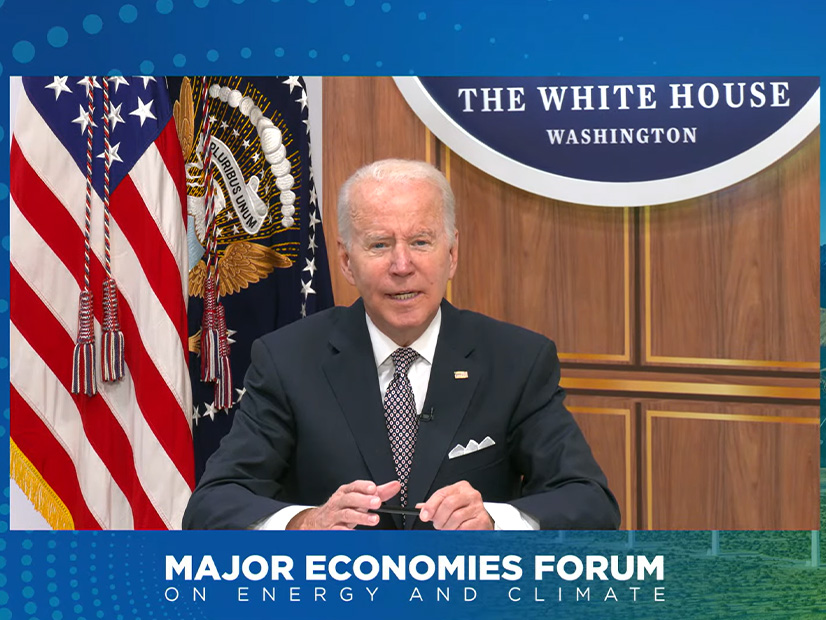With inflation raging and gasoline prices at record highs, President Joe Biden on Friday called for new international initiatives to cut greenhouse gas emissions and dependence on Russian fossil fuels.
Despite mounting threats to energy and food security triggered by Russia’s war on Ukraine, Biden told members of the Major Economies Forum (MEF) on Energy and Climate in a virtual meeting, “We cannot afford to let the critical goal of limiting global warming to 1.5 degrees Celsius slip out of our reach. And the science tells us that the window for action is narrowing rapidly.
“We have to dedicate ourselves as we look forward to delivering on existing goals and undertaking additional efforts to boost our progress,” said Biden, who has sought to assert U.S. leadership on climate policy despite the economic and political challenges he faces with the upcoming midterm elections.
Speaking at the meeting, United Nations Secretary-General António Guterres was even more direct in linking the war in Ukraine to the need for urgent climate action.
“We seem trapped in a world where fossil fuel producers and financiers have humanity by the throat,” Guterres said. “The argument of putting climate action aside to deal with domestic problems also rings hollow. Had we invested earlier and massively in renewable energy, we would not find ourselves once again at the mercy of unstable fossil fuel markets,” he said.
New efforts to reduce emissions from methane flaring and leaks led the list of proposed actions, building on the Global Methane Pledge launched at the UN Climate Change Conference of the Parties (COP 26) in Glasgow in November. (See US, Canada, EU Pledge to Slash Methane Emissions.)
“Each year, our existing energy system leaks enough methane to meet the needs for the entire European power sector,” Biden said, announcing the Global Methane Pledge Energy Pathway. “We flare enough gas to offset nearly all of the [European Union’s] gas imports from Russia. And so, by stopping the leaking and flaring of this super-potent greenhouse gas and capturing this resource for countries that need it, we’re addressing two problems at once.”
Argentina, Canada, Egypt, Germany, Italy, Japan, Mexico, Nigeria and Norway have joined the initiative, committing to eliminate “routine flaring” no later than 2030 and pledging $59 million in “dedicated funding and in-kind assistance,” according to a meeting summary from the White House.
Egypt, which will host COP 27 in Sharm el-Sheikh in November, is also among the 120 countries that have signed the original pledge to cut methane emissions 30% from 2020 levels by 2030.
Biden called on other countries to adopt the U.S. goal for zero-emission vehicles — electric, plug-in hybrid and fuel cell cars — to make up 50% of all light-duty car sales by 2030.
With Canada, Chile, the European Commission, France, Germany, Italy, Mexico, Norway and the United Kingdom signing on, Biden said, “Over the long run, we can remove the pain of volatile gas prices and reduce transportation emissions.”
Nonspecific Pledges and Support
Former President Barack Obama founded the MEF in 2009, with 16 other countries. At Friday’s meeting, 22 countries, the European Commission and the United Nations were represented.
The meeting was also a precursor for the Global Clean Energy Action Forum, a pre-COP 27 event to be held in Pittsburgh in September.
But, as reported in the White House summary, results coming out of the MEF meeting consisted mostly of nonspecific pledges for future action and expressions of support.
Several countries stated their intention to increase their Nationally Determined Contributions (NDCs) to emissions reductions — to keep global warming to 1.5 degrees by 2050 — with announcements to be made at COP 27. But only Australia provided a solid number for its “enhanced NDC,” committing to cut emissions 43% below 2005 levels by 2030.
Similarly, other countries “supported,” but have yet to commit to act on, Biden’s other new initiatives.
Biden called for a $90 billion international commitment for clean energy demonstration projects such as green hydrogen production and carbon capture by the September forum in Pittsburgh. The U.S. and the European Commission are planning a total of $50 billion in funding for such projects, the White House said, including $21.5 billion from the Infrastructure Investment and Jobs Act.
Two additional initiatives target shipping and agricultural emissions. Launched by the U.S. and Norway, the Green Shipping Challenge calls on “governments, ports, maritime carriers, cargo owners, and others to come forward at COP 27 with concrete steps … that will help put the international shipping sector on a credible pathway this decade toward full decarbonization no later than 2050,” the White House said.
Biden’s Global Fertilizer Challenge “aims to raise $100 million by COP 27 to strengthen food security and reduce agricultural emissions by advancing fertilizer efficiency and alternatives,” according to the White House. The goal is to reduce agricultural emissions and food insecurity “by helping countries with high fertilizer usage and loss adopt efficient nutrient management and alternative fertilizers and cropping systems,” the White House said.
Russia leads the world in fertilizer exports.




